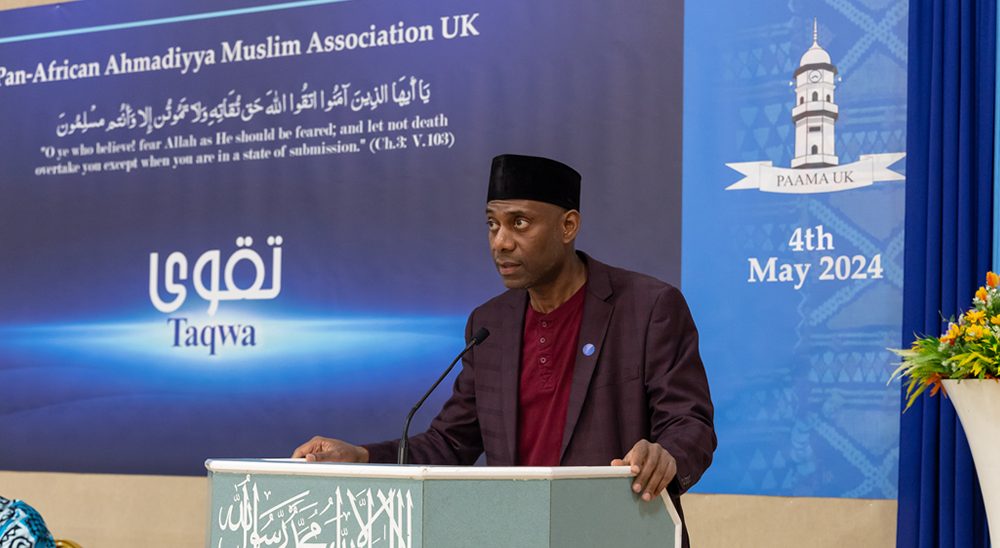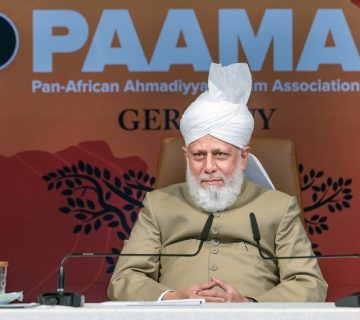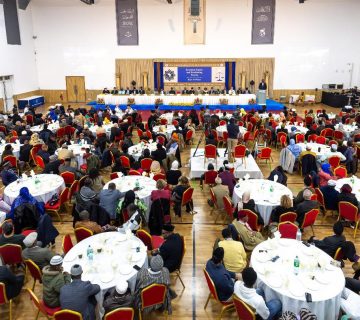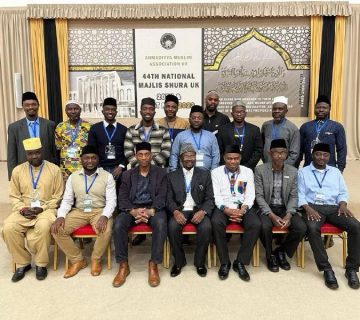By Tommy Kallon, President PAAMA UK.
“O children of Adam, We have indeed sent down to you raiment to cover your nakedness and to be a means of adornment; but the raiment of righteousness —that is the best.” (Holy Qur’an, Ch.7:27)
Honoured Guests, Dearest PAAMA Family,
Assalamu Alaikum wa Rahmatullahi wa Barakatuhu.
By the grace of Allah and by His grace alone, we have the immense privilege and pleasure of convening here on the auspicious occasion of the 6th National PAAMA Ijtema being held under the blessed auspices and special dispensation of our Beloved Khalifa (may Allah be his Helper).
The National Ijtema is an institution in itself. It has a long and rich history in the Jama’at and is rooted in the traditions of Islam. It provides a unique opportunity for members to come together in the true spirit of brotherhood and sisterhood and ultimately for the remembrance of Allah. It provides a platform for training and self-development and serves as an avenue for gaining religious knowledge. It also provides an occasion to renew old friendships and make new acquaintances. It provides a stage for us compete with each other be that in academics or in sports and hence to rise to the Qur’anic injunction that we should ‘vie with one another in good works.’ (Ch.2:149)
Over the last few years, due to the Covid pandemic our National Ijtema has been held virtually if at all, meaning this is the first time we are holding our Ijtema in person since 2019. It therefore gives me great pleasure, alongside those attending this event after many years, to particularly welcome those who are attending this event for the first time ever.
I take the opportunity to record our deepest gratitude to Nazim-e-A’la Shafiq Kusi Sahib and the many members of the Ijtema Organising Committee, male and female, who have worked with tremendous endeavour and enterprise to enable to enter upon this day with excitement and anticipation. I also would also like to thank the many members of PAAMA who have taken the time to travel far and wide to attend and participate in this Ijtema and I acknowledge the presence of the many judges, ladies and gents, who have graced us with their presence here today to support us in adjudicating various competitions. May Allah bless and reward all the organisers, participants, judges and guests for their invaluable contributions to this event. Ameen.
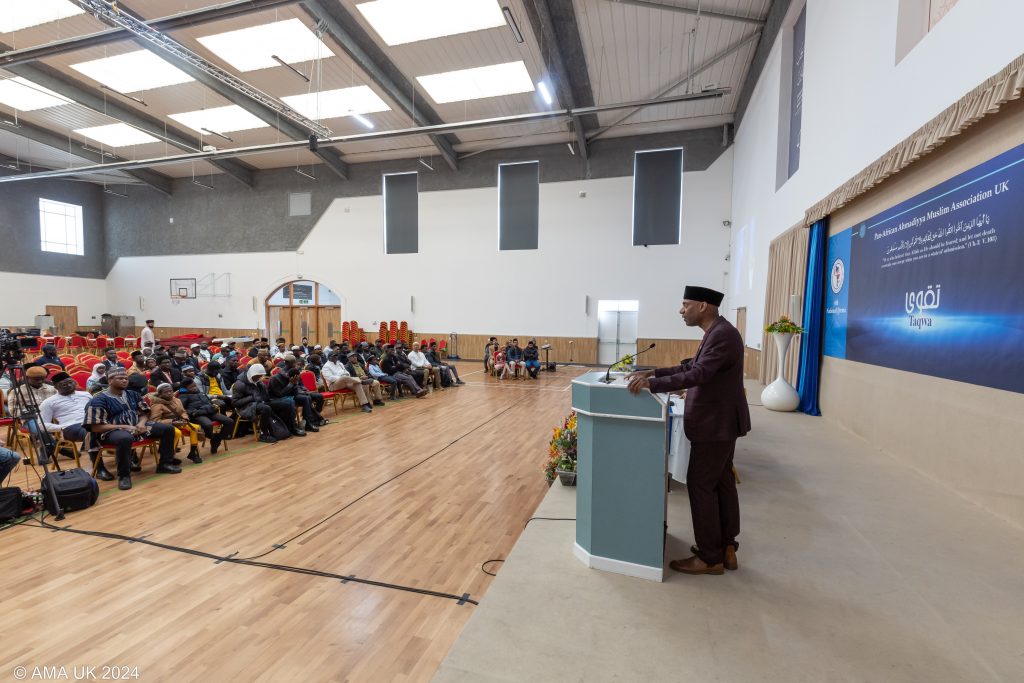
The theme of this year’s Ijtema, as we know, is “Taqwa”, that is, righteousness. This carries deep significance for every member of PAAMA today not only because Taqwa is a cornerstone of our faith—a concept that embodies the spiritual essence and ethical compass of Islam—but particularly because it is the theme most graciously chosen for this Ijtema by none other than Huzoor Aqdas himself, at once making this Ijtema historic in that sense as it is the first time ever that Beloved Huzoor (aba) has himself given a theme for our PAAMA Ijtema.
And so, my dearest members of PAAMA, the wisdom of Khilafat invites us today to reflect upon and delve into a profound theme which resonates at the core of our faith, guiding us as a beacon of spiritual consciousness and moral rectitude.
The wisdom of Khilafat invites us to weave a tapestry of thought around a notion that is the very bedrock of our religion, a compass that helps us navigate through the stormy seas of materialism and irreligion.
The wisdom of Khilafat invites us to focus our attention on the north star that guides our actions, directs our path and influences how we speak, how we act and how we interact with both our Creator and with His creation.
The Arabic term “Taqwa” is derived from the root word “waqaya” which means to shield oneself or to protect from harm or evil or, in religious parlance, to take God as a shield for protection against sins. It is often translated as “fear of Allah” but, in reality, it encompasses much more. Like a diamond, its brilliance lies in the multitude of facets it reflects.
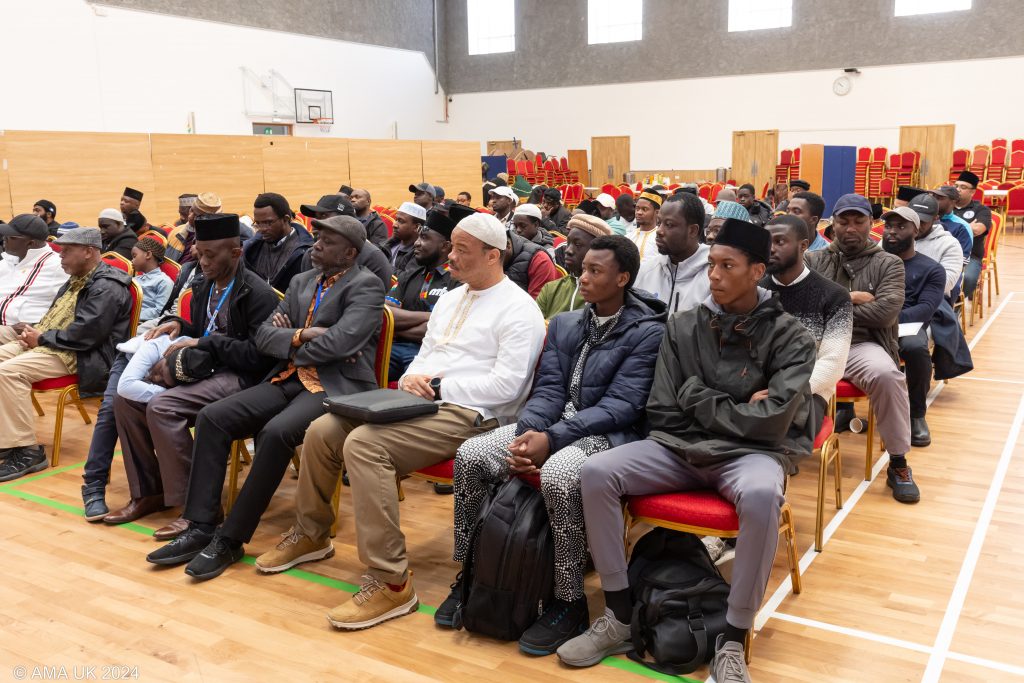
In the context of Islamic ethos, Taqwa signifies a state of awareness of Allah in all that we do which serves to protect us from spiritual deviations and moral failings. Taqwa is the armour that guards our souls against the spears of sin and the shield that deflects the daggers of doubt. Taqwa is the quality that inspires us to act righteously, not out of fear of societal judgment, but out of absolute awe, profound veneration and deep-seated reverence for our Creator.
Taqwa, therefore, encompasses not just the fear of Allah but also the love of Allah. These elements combine to forge a believer who is balanced, edified and driven by a purpose that transcends worldly gains and desires.
To live with Taqwa is to walk on eggshells in the chambers of sin, to tread lightly and cautiously, fully aware that the eyes of Allah never blink, that His scales are ever precise and that His ledger misses not a dot.
Ubayy bin Ka‘b (ra), a distinguished Companion of the Holy Prophet (saw), best explained this concept of Taqwa by likening a Muttaqi to a man who walks through thorny bushes, taking every possible care that his clothes are not caught in, and torn by, the branches. (Kathir)
An Arab poet, Ibnul-Mu‘tazz, has expressed the same idea in the following beautiful verses:
Avoid all sins both small and great—that is Taqwa.
And act like one who walks through a land full of thorny bushes,
Cautious of all things that one sees.
Do not think lightly of small sins,
For even big mountains are made up of tiny pebbles.
(Kathir)
A Muttaqi, therefore, is one who is ever on his guard against sins and takes God for his shield or shelter by maintaining a strong moral and ethical stance, performing actions that are in accordance with Divine guidance and protecting oneself from displeasing God.
The Holy Quran, our eternal guide, mentions Taqwa nearly 250 times, intertwining it with the fibres of belief and the threads of Divine guidance. About this the Promised Messiah (as) writes:
“In the Holy Qur’an more emphasis has been laid on virtue and righteousness than on any other commandment. The reason for this is that righteousness bestows the strength to resist all vice and urges progress towards all good. Righteousness is in all circumstances a charm that guarantees security and is a citadel for safeguarding against all harm.”
The verse quoted at the head of this address informs us that the raiment of righteousness or Taqwa is, in fact, the real apparel for man. Ordinary dress covers our physical bareness while the garment of Taqwa covers our spiritual and moral bareness. The verse beautifully reminds us that just as we consider it necessary to have good clothing to cover our physical bareness and don elegant dress to look graceful, we should be even more anxious to cover our moral and spiritual bareness by adopting Taqwa.
Taqwa teaches us to avoid not only those things which impair man’s relation with God but also those which impair the relation between man and man. Taqwa is the whisper of conscience that keep us steadfast when temptations lure. It is the inner voice that calls us to rise above pettiness, to hold the tongue when anger flares and to extend a hand when grudges seek to divide.
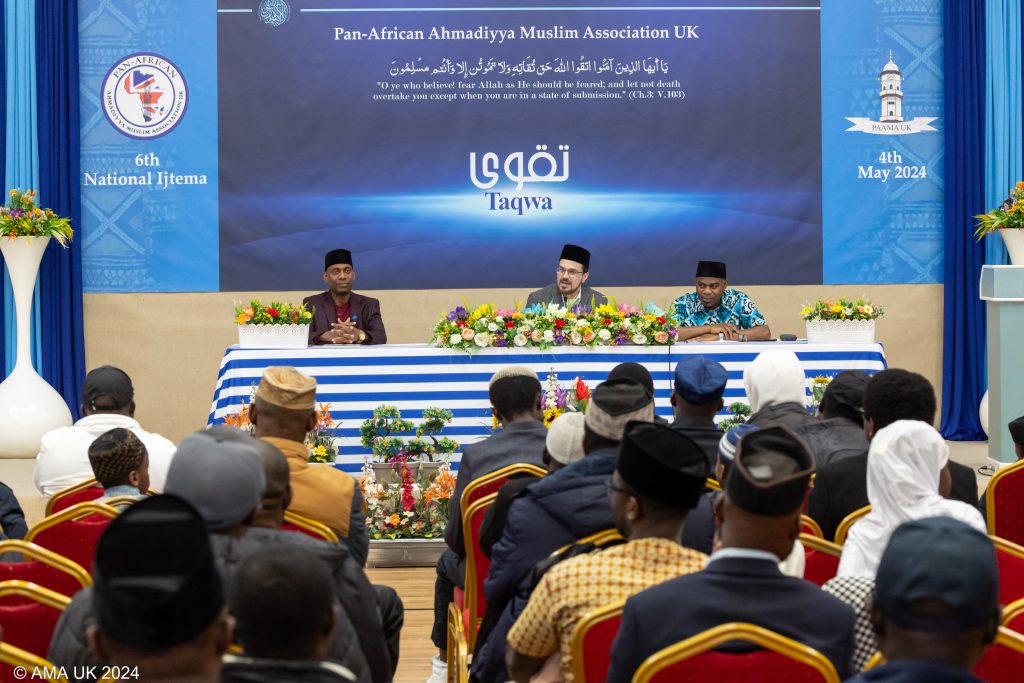
Consider the wisdom of our Beloved Holy Prophet (saw), who painted the picture of Taqwa so vividly when he said, “Taqwa is here” pointing to his chest three times; to the heart, the seat of human emotion and decision.
Distilling this further through the lens of daily life, Taqwa is our most trusted currency. In the labyrinth of life’s decisions, it is the golden thread that guides us out of the maze of moral dilemmas. In the symphony of society, it is the tuning mechanism that keeps the orchestra of our actions harmonious and melodious.
In practical terms, Taqwa affects every aspect of our lives. Economically, it teaches us to earn through halal means and spend in the cause of Allah. Socially, it obliges us to treat others with dignity and compassion, respecting the sanctity of life, property and honour. Politically, it demands absolute justice and advocacy against transgression. Environmentally, it enjoins us to steward the earth with care and gratitude. Religiously, it encourages us to promote interfaith dialogue and understanding.
For righteousness is a common denominator among all religions founded on Divine Unity. In his famous Sermon on the Mount, where he pronounced the nine Beatitudes, Jesus Christ (as) is reported to have said:
“Blessed are those who hunger and thirst for righteousness,
for they will be satisfied.
Blessed are those who are persecuted for righteousness’ sake,
for theirs is the Kingdom of Heaven.”
Both these Beatitudes underscore a principle central to all Divinely inspired religions: that true fulfilment and eternal reward are found not in earthly approval or comfort but in committing to righteousness.
In today’s world, where moral dilemmas and ethical crises are prevalent, the cultivation of Taqwa can serve as a guiding star. It can help bridge divides, heal communities and inspire a collective commitment to virtues that uplift humanity. As Ahmadi Muslims, if we embody Taqwa, we not only improve our own lives but also become beacons of light and sources of inspiration for others around us.
In the hustle and bustle of the 21st century, where the rat race often drowns out the call to prayer, where the neon lights obscure the stars that once guided caravans through the desert, the call to Taqwa becomes ever more urgent.
As we stand at the crossroads of history, amid the clamour and clang of modernity, Taqwa should be the silent titan in us that rises against the tide, that stands tall when the winds of change blow fierce and cold.
We should not just carry Taqwa in our hearts but let it spill over into our deeds. The essence of Taqwa lies in its ability to elevate our moral and ethical boundaries, guiding us to live by the highest standards of integrity and accountability. It calls us to be mindful of Allah in the privacy of our thoughts and in the public sphere of our actions.
The Holy Quran, in its opening verses, describes itself as a perfect book in which there is no doubt, a guidance for the righteous who believe in the unseen, observe prayer and spend out of that which is bestowed upon them. This direct link between Taqwa and the performance of righteous deeds establishes that Taqwa is not merely an internal feeling but manifests through our actions and interactions with the world around us.
It should be the light that others see when the world grows dark, the warmth that others feel when the cold bites deep. We should be the mirrors that reflect this holy attribute, so that those who look at us see the reflection of our Creator.
Allah, our Creator, says in the Holy Qur’an:
“Whatever of good you do, Allah will recognise its value. Furnish yourselves with necessary provisions; surely, the best provision is righteousness. Be ever mindful of your obligations to Me, O ye who possess understanding.” (Ch.2:198)
Taqwa, therefore, is the provision that elevates an individual’s actions from mere routine to acts filled with profound reverence and mindfulness of the Divine. It is a comprehensive state of being and a continual awareness that influences every action, thought and interaction in a person’s life.
Taqwa is a communal and social principle as much as it is a personal one. The societal implications of Taqwa are reflected in the verse of the Holy Quran that states “the most honourable among you, in the sight of Allah, is he who is the most righteous among you.” (Ch.49:14) True honour and greatness, therefore, proceed from Taqwa and Taqwa alone.
The same message is conveyed in the Farewell Sermon of the Holy Prophet (saw) wherein he emphasised that, our God being One and our ancestor being one, there is no superiority of one over another except by righteousness. Taqwa stands as a towering lighthouse that shines upon a person’s moral integrity and spiritual insight differentiating and exalting him above others.
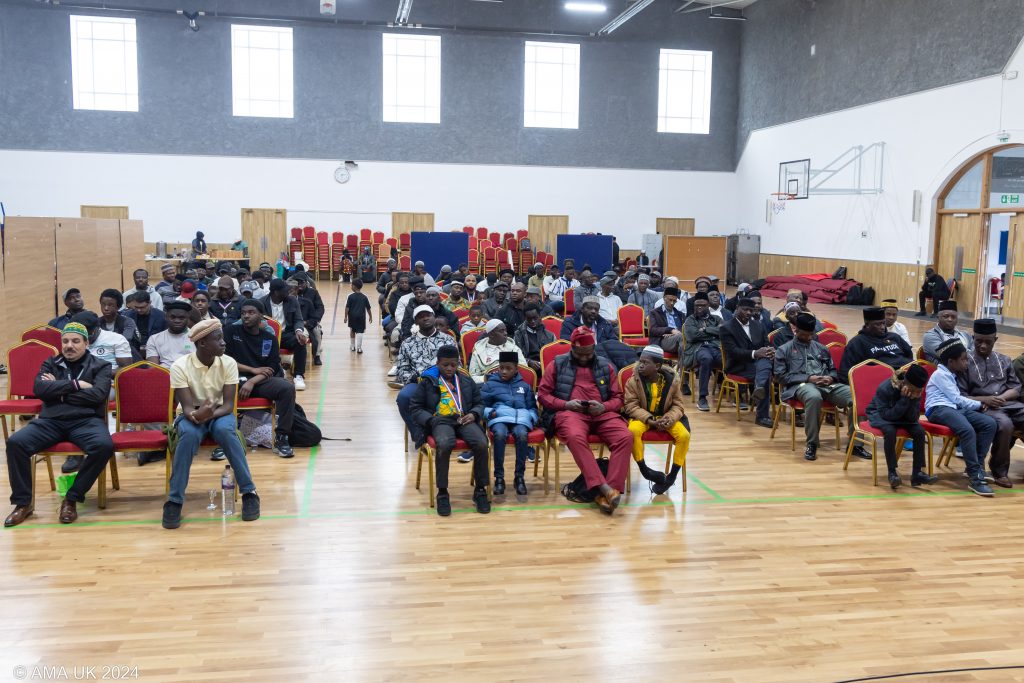
My Dear PAAMA Family! As we continue to navigate the complexities of life, let us at this blessed Ijtema pledge to revive Taqwa in our hearts, in our homes and in our habitats. Let us strive to foster this beautiful trait in ourselves and in our communities. Let us strive for excellence in all aspects of our lives and imbue our everyday actions with meaning and purpose by infusing them with Taqwa.
In the end, we should remember that the pursuit of Taqwa is a journey, not a destination. It is a lifelong endeavour that evolves and deepens as we continually seek closeness to our Creator. Let this Ijtema be a milestone in that journey for each of us, a place where we recommit ourselves to live with Taqwa at the forefront of our minds always.
May Allah grant us clarity on this perpetual journey towards greater Taqwa and grant us the strength to be champions of Taqwa, today and every day.
May Allah guide us to be among those who are truly righteous, who inspire righteousness and who strive for a world filled with peace, justice and righteousness.
May Allah increase us in Taqwa, guide us in the paths of righteousness and blesses us with the wisdom to act upon His commandments.
May our gathering here today inspire us to reflect upon our own levels of Taqwa and find meaningful ways to incorporate it more deeply into our daily lives.
May this Ijtema be as enlightening and inspiring as the profound theme we are, through the wisdom of Khilafat, privileged to ponder. Ameen thumma Ameen.
Thanks for having me. Wassalamu Alaikum.

